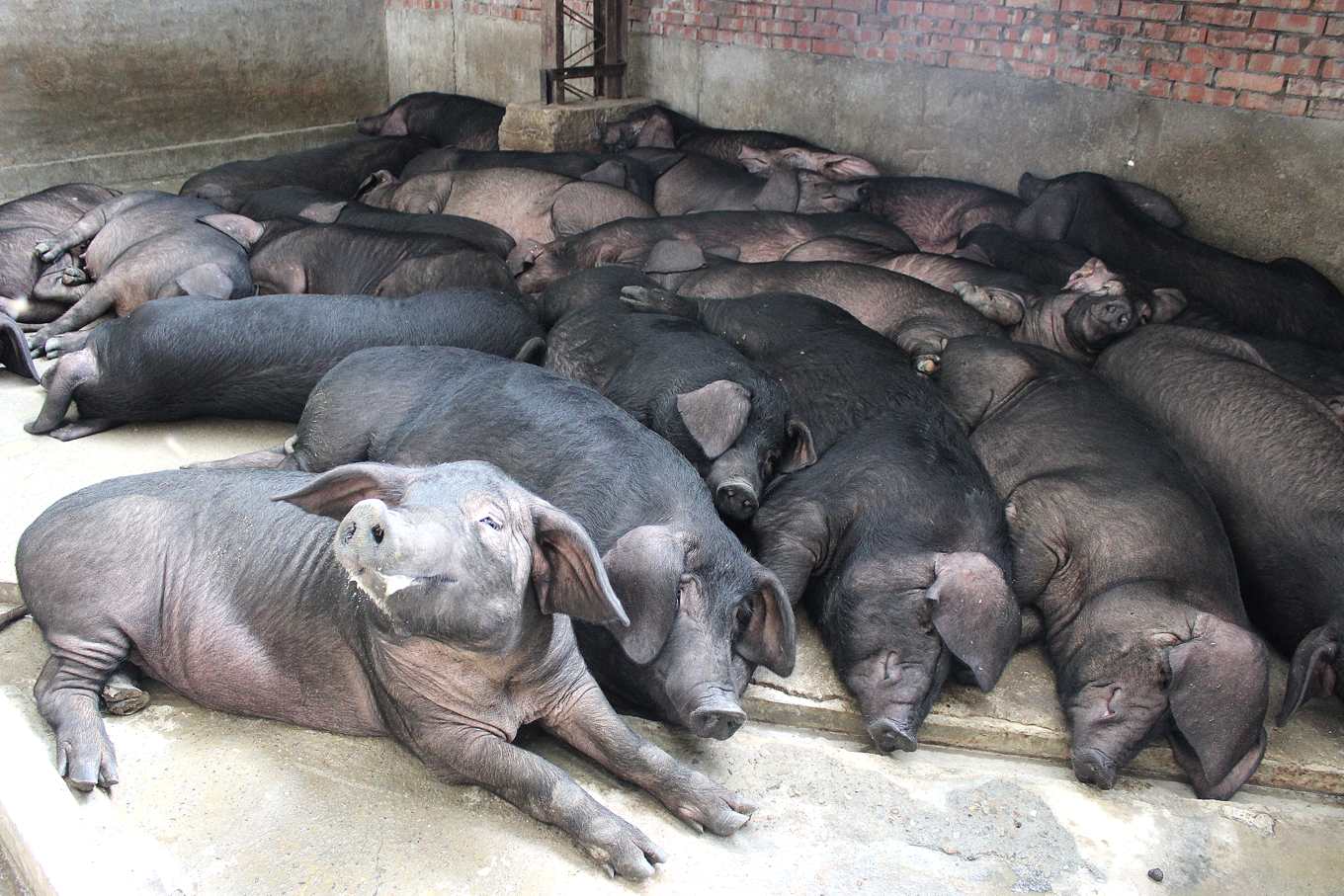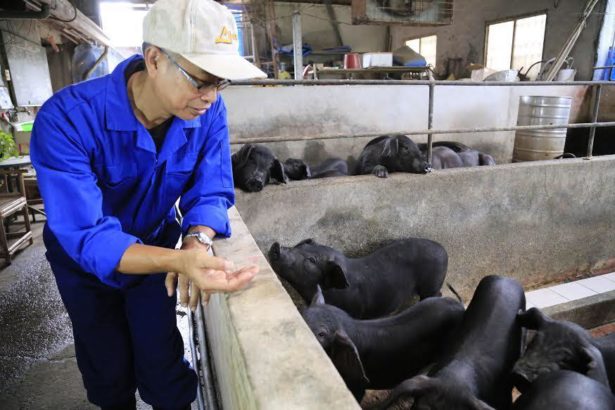The battle between epidemic prevention and kitchen waste 01 "hit kitchen waste pig, pig farmer: This is our life property, we are more afraid of darts than anyone else!
Share1.2K + 1 Tweet EmailShares 1.2K
"Series foreword": as the bodies of African swine fever dead pigs invade their homes and float to the Jinmen beach, it is announced that the enemy is under the siege of the city, and the epidemic prevention campaign is becoming increasingly fierce. In addition to the border campaign to stop the virus, the "civil war" in the domestic pig industry is also heating up. As food waste is one of the ways of transmission of the disease, there is a high degree of disagreement on whether to ban the raising of pigs with food waste.
The Taiwan Pig Youth Alliance, which focuses on feed raising white pigs, launched a co-signature, advocating that regardless of whether the food waste is cooked at high temperature or not, the government should completely ban the raising of pigs with food waste, protect the rights and interests of 88% of pig farmers, and completely eliminate food waste and raise pigs to carry out industrial transformation. Farmers who raise black pigs with food waste think that if the food waste is cooked at high temperature, there is no doubt about the spread of the disease. Keeping the food waste from raising pigs not only preserves the culture of black pigs, but also solves the problem of environmental protection, shouting, "in the fight against epidemic, pig farmers should unite as one." how can you want to eliminate these 12% of black pig farmers first? "
And kitchen waste is not only related to the pig industry, but also a thorny issue of waste disposal. According to the response of environmental protection units, the pig industry can remove 770000 tons of food waste a year. If the recycling mechanism is suddenly and completely banned, it will cause food waste to have nowhere to go and be dumped at will. It is a disaster of environmental protection and epidemic prevention. What is the current situation of raising pigs with food leftovers and clearing transportation? How to strike a balance among epidemic prevention, environmental protection and pig industry? "upstream and downstream" went deep into the scene and interviewed the parties and experts. This series is divided into four articles, hoping to find practical answers to problems. This article is one of series four.
Small files of black and white pigs: according to the statistics of the Council of Agriculture, there are 7240 pig farms in China, with a total of 5.39 million pigs, of which 2045 farms raise pigs with food waste (650000 pigs, accounting for 12%, and 22% in terms of the number of households) are mostly black pig farms. The feeding period of white pigs is about 6 ─ 7 months, while that of black pigs is at least 15 months. Chu Youtian, a professor in the Department of Animal Science and Technology at National Taiwan University, explains that the lives of native black pigs are interdependent with Hakkas and Fukienese, and Taiwanese 'insistence on "black pig flavor" contains strong cultural and emotional factors. In the process of domestication of livestock, most black pigs are fed with food waste, but European and American breeds such as Pankxia and Duroc White pigs are almost fed with feed.

-1.jpg)
Kitchen waste cooking equipment for small livestock farms. (photo / Lin Xiejun)
Despite doubts about eligibility, small pig farmers may be forced to leave their herds.
The above two kinds of pig farms roughly reflect the epitome of kitchen leftover pig farms in Taiwan. According to the statistics of the Council of Agriculture, there are 2045 food waste pig farms in Taiwan. The scale of the 357 farms qualified by environmental protection units is relatively large, and there is no need to worry about the cooking process of food waste at high temperature. excluding those who receive feed subsidies and leave animal husbandry subsidies, there are still 1155 small pig farms, which have also been inspected by the Environmental Protection Agency and are all equipped with cooking equipment, but the standard of security inspection and epidemic prevention is not as good as that of the large field, and the disinfection of people and vehicles in and out of the market is not complete.
The Council of Agriculture earlier stipulated that as long as the cooking equipment passed the inspection, they could continue to use food waste to raise pigs, but under the heating up of the epidemic and the strong protest from feed pig farmers, the Council of Agriculture announced on the 6th that only 357 pig farms registered with environmental protection units could continue to use food waste, and other pig farmers had to obtain a "reuse check" within a week if they wanted to use food waste to raise pigs. As a result, 1155 pig farms like Ade, which are difficult to qualify for environmental inspection in a short period of time, may all face the fate of being forced to switch to feed or leave livestock. (continue to read)
Series of reports on African Classical Swine Fever epidemic Prevention and Kitchen waste War
(for news related to African classical swine fever, please click here to read)
Share1.2K + 1 Tweet EmailShares 1.2K
- Prev

I haven't made a toast to you for a long time. I'm AtayalTradtionalCuisineExperience at the Atayal Dinner.
I haven't made a toast to you for a long time. I'm AtayalTradtionalCuisineExperience at the Atayal Dinner.
- Next

Epidemic Prevention and Kitchen waste War 02 "Pig Farmers' Civil War: high risk of raising pigs and lagging behind vs Kitchen wastes can be classified in detail except for high temperature cooking.
Epidemic Prevention and Kitchen waste War 02 "Pig Farmers' Civil War: high risk of raising pigs and lagging behind vs Kitchen wastes can be classified in detail except for high temperature cooking.
Related
- A course of planting techniques and methods on how to grow carrots
- How to plant the latest tulips?
- Is it better to pick tea in the morning or in the afternoon? When is the best time for tea to be picked? what is the third or fifth tea?
- Launch Yuanxiao Happy combination Haocha + Tea Yuan healthy Taste
- Penghu Tourism "Fireworks 20 Parade with You"
- 2022 West Lake Happiness holds "Digital Revitalization Voucher" and draws iphone13 and laptop.
- Banqiao Fuzhou social houses are designed to change start-up combined with police elimination to create a safe and livable environment
- The convenient measure of "mechanical weeding" in Xinbei has been abused and the Agriculture Bureau has imposed heavy penalties on the illegal land consolidation.
- Changgeng University Joins Hands with Four Memory Factories to Rescue Memory Talent Shortage
- The list of Taiwan's top 100 MVP managers is listed by the Director-General of the Farmers' Association of Sanxia District.

